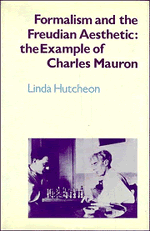Book contents
- Frontmatter
- Contents
- Preface
- Acknowledgments
- Introduction
- Part I The critical formation: science, formalism, and aesthetic contemplation
- Part II Psychoanalysis and literary criticism
- 5 Scientific psychology and art
- 6 Psychoanalysis and psychocritique
- 7 Psychocritique: formalism, science, and the value of problems
- 8 Psychocritique and the modern French critical context
- Conclusion
- Appendices
- Notes
- Index
7 - Psychocritique: formalism, science, and the value of problems
Published online by Cambridge University Press: 12 January 2010
- Frontmatter
- Contents
- Preface
- Acknowledgments
- Introduction
- Part I The critical formation: science, formalism, and aesthetic contemplation
- Part II Psychoanalysis and literary criticism
- 5 Scientific psychology and art
- 6 Psychoanalysis and psychocritique
- 7 Psychocritique: formalism, science, and the value of problems
- 8 Psychocritique and the modern French critical context
- Conclusion
- Appendices
- Notes
- Index
Summary
Car l'artiste est d'abord cet homme qui crée des êtres de langage.
charles mauronFREUD CONFESSED, on many occasions, that the subject matter of works of art interested him much more than those formal or technical qualities in which artists themselves seemed to place the value of art. He had little appreciation for music, he claimed, precisely because he could not explain to himself the effect of that art form. Freud attributed this failing to his “rationalistic, or perhaps analytic, turn of mind” (1914b; 13: 211). After spending an evening with an artist, Freud wrote in exasperation to Ernest Jones: “Meaning is but little to these men; all they care for is line, shape, agreement of contours. They are given up to the Lustprinzip.” Critics of the application of psychoanalysis to art have been quick to point out the aesthetic reductionism involved in ignoring form. However, Freud's personal limitation of interest to content was not, in fact, one shared by all his followers. Otto Rank, for example, actually claimed that form determined content, although his concept of form was hardly that of Roger Fry. “As it appears to us,” Rank wrote, “all form goes back to the primal form of the maternal vessel.” Ernest Jones, always more orthodox in his Freudianism, argued that form or the ordering of chaos was a sublimation of infantile enjoyments and represented a fixation on a stage of primary pleasure or forepleasure.
- Type
- Chapter
- Information
- Formalism and the Freudian AestheticThe Example of Charles Mauron, pp. 134 - 162Publisher: Cambridge University PressPrint publication year: 1984



